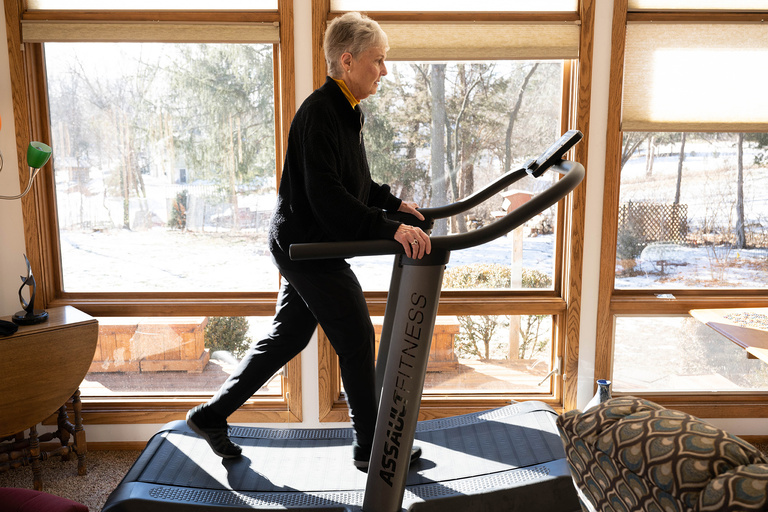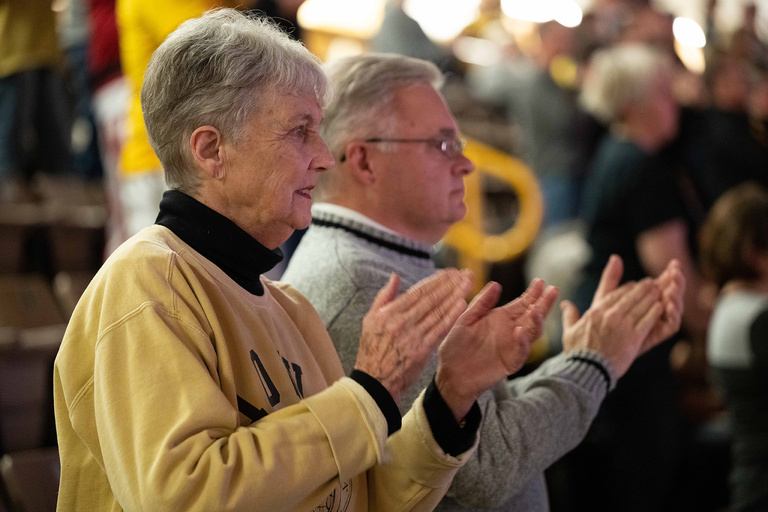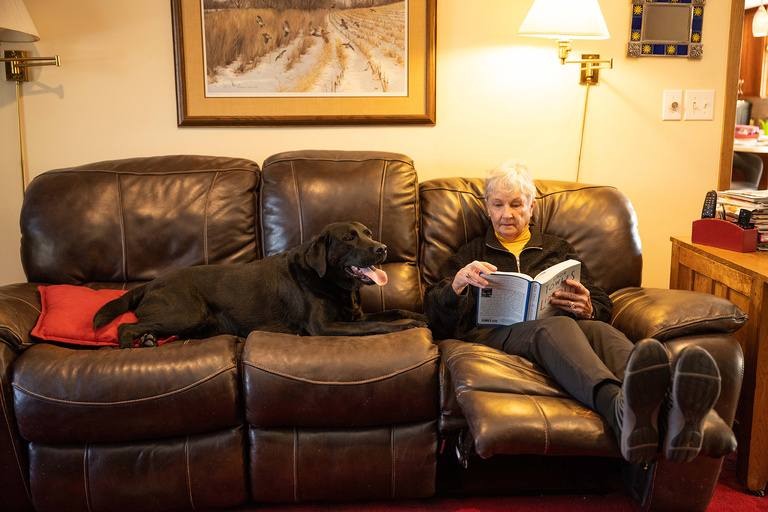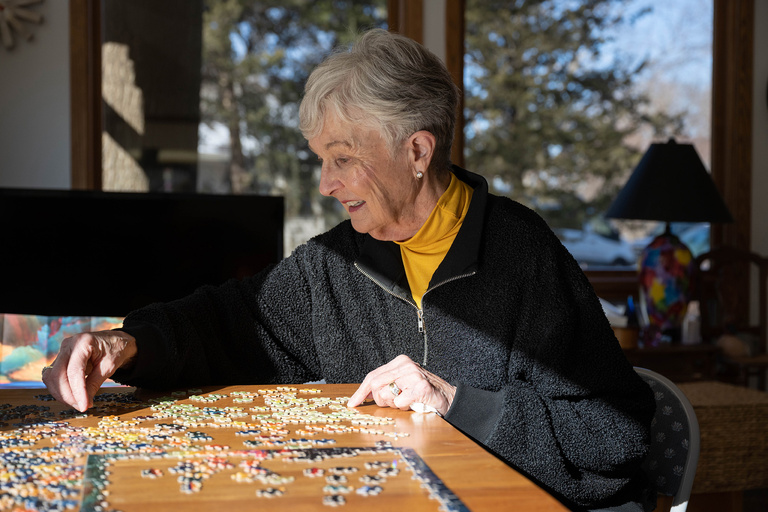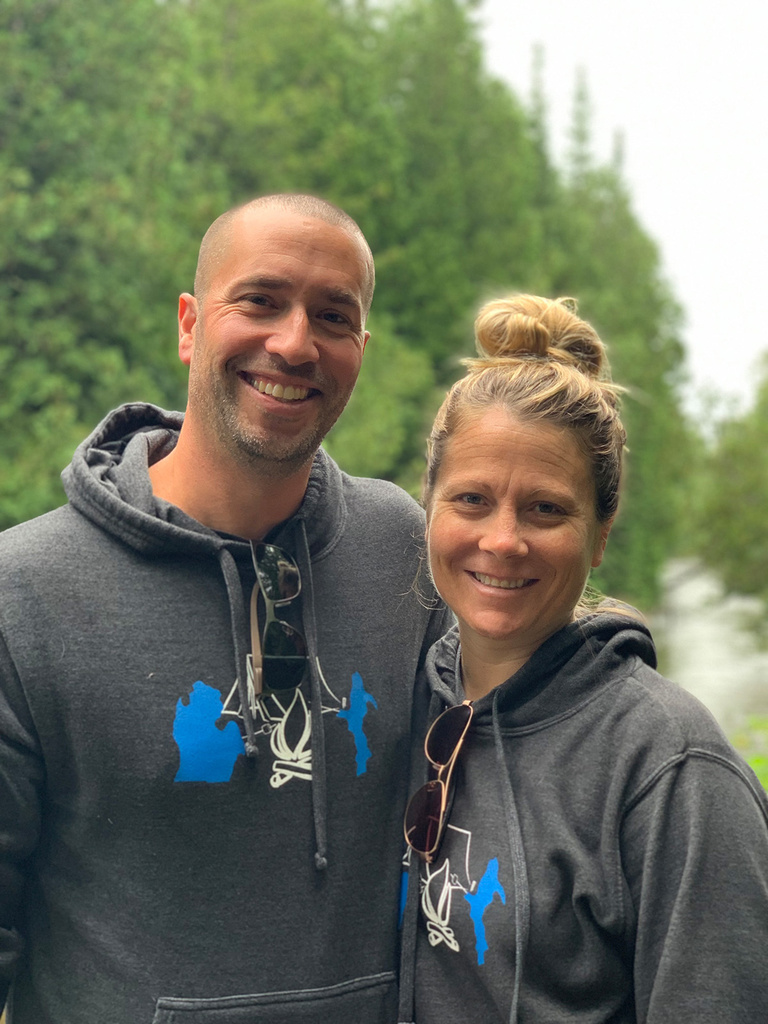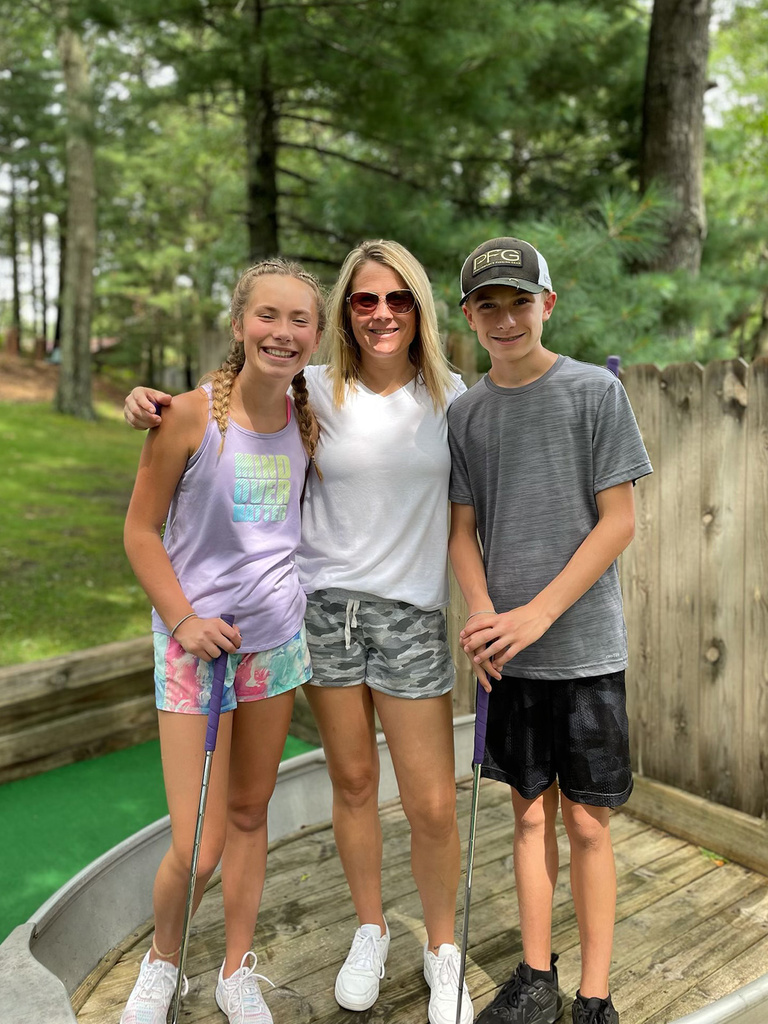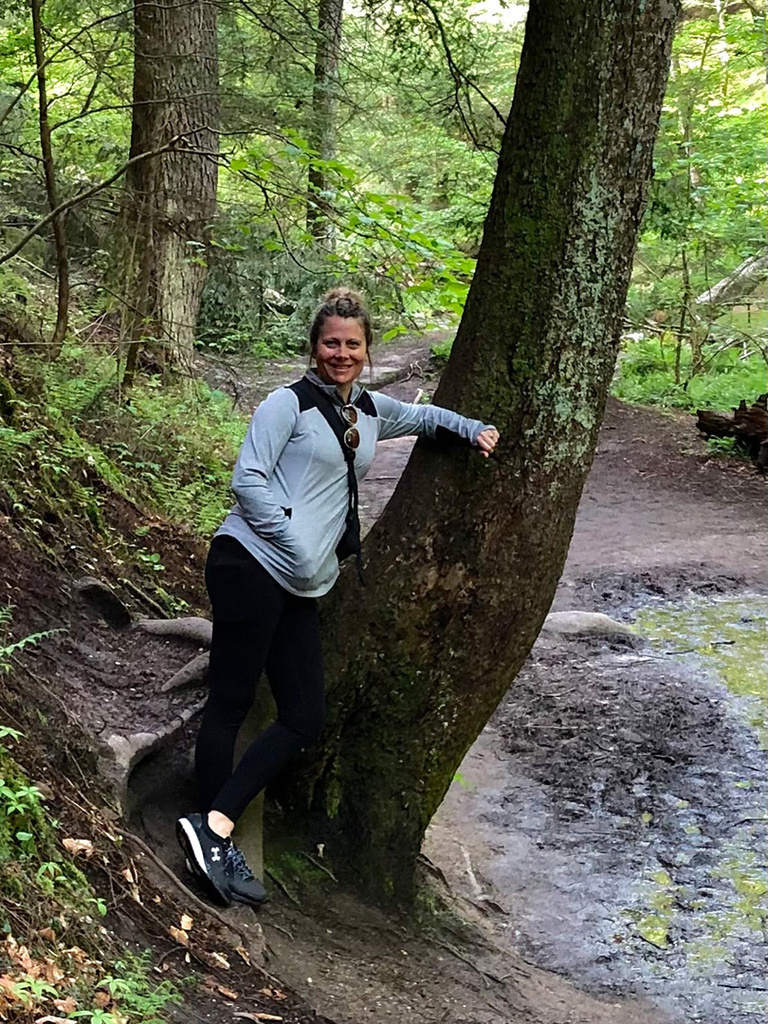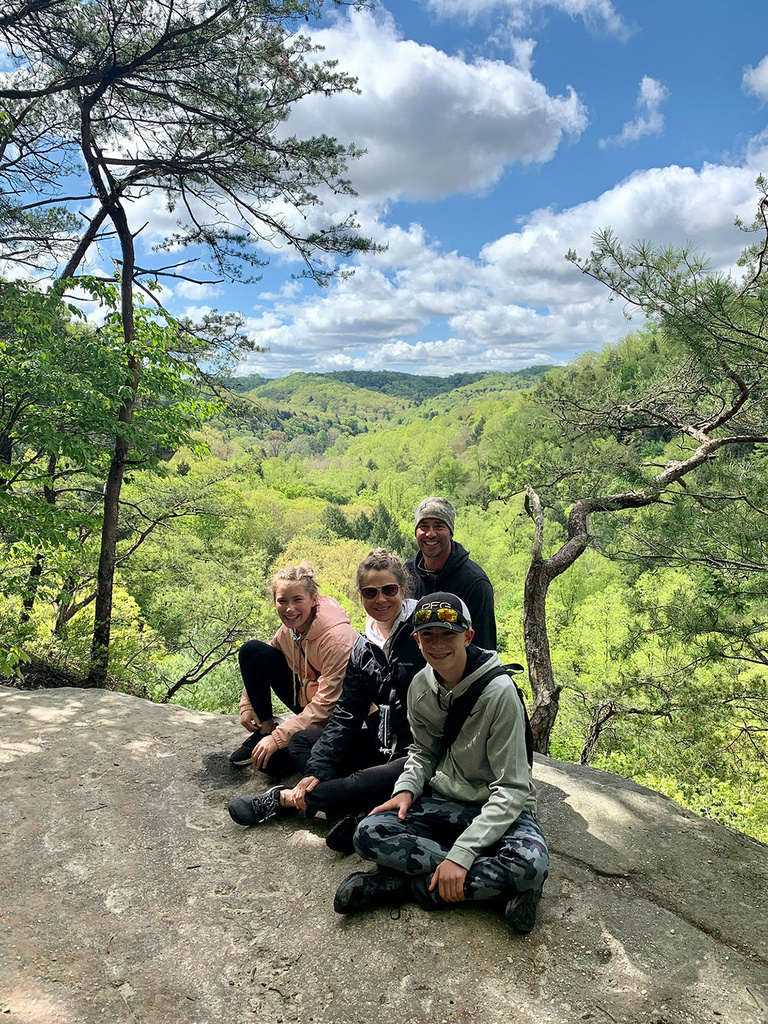Not only does the University of Iowa offer a variety of treatment options for a range of cancers, from the most common types to the rarest, campus investigators are working daily to make those treatments better. And patients play a key role.
The top photo...
When Jordan Hauck of Huxley, Iowa, learned he had stage 4 melanoma at age 27, he wasn’t going to let the diagnosis knock him down. He participated in clinical trials at the University of Iowa and has had no recurrence since his treatments ended in 2014. Now he has a business that aims to increase skin cancer awareness and support cancer research at Iowa.
Story: Sara Epstein Moninger
Photography: Tim Schoon
Published: Feb. 25, 2022
In 2015, Beth Frohwein was resigned to die.
What had appeared to be a small, black wart on the side of her big toe the year before turned out to be an aggressive skin cancer called melanoma. It quickly spread to a lymph node in her groin, and at one point she had 30 tumors on her right leg. No therapies could contain it.
Then she met with Mohammed Milhem, MBBS, an expert in melanoma and sarcoma and the associate director of clinical research at University of Iowa Holden Comprehensive Cancer Center. He presented Frohwein with a list of treatment options that included experimental therapies being studied at Iowa.
Frohwein, who was 60 at the time, told her doctor that she had lived her life and was ready to accept death. But Milhem wouldn’t hear it. Instead, he connected Frohwein with several clinical trials at Iowa for treating melanoma. Today, more than a year after enrolling in a promising trial led by Milhem, Frohwein has had no recurrence of cancer.
“The treatment for melanoma has changed so much in just five years, it’s unbelievable,” says Frohwein, who participated in other UI trials as well. “Every time I see Dr. Mo, he thanks me for participating in these trials, for helping so many other people. Well, that’s why I did it — for other people — but it’s helped me too.”
The now-retired certified nursing assistant from the central Iowa town of Zearing says she is feeling well and has enjoyed unexpected time with her husband, children, and grandchildren. She credits the efforts of investigators at the University of Iowa for constantly probing new and better cancer therapies through laboratory research and clinical trials.
“I went to the right place when I went to Iowa. I know that people with cancer go all over the country for treatment, but I wasn’t going to do that when Iowa City was just down the road with one of the top cancer centers,” she says. “The researchers at Iowa are just remarkable. They’re coming up with new ideas all the time, and they aren’t giving up.”
Frohwein participated in one of approximately 200 clinical trials that are underway at any one time at Holden, which sees nearly 5,000 new cancer cases a year and enrolls hundreds of patients in clinical research. The trial Milhem enrolled her in involves a drug called CMP-001, which mimics a viral infection and spurs the immune system into action when it’s injected into the environment of a tumor — a discovery that was made, in large part, through Iowa research.
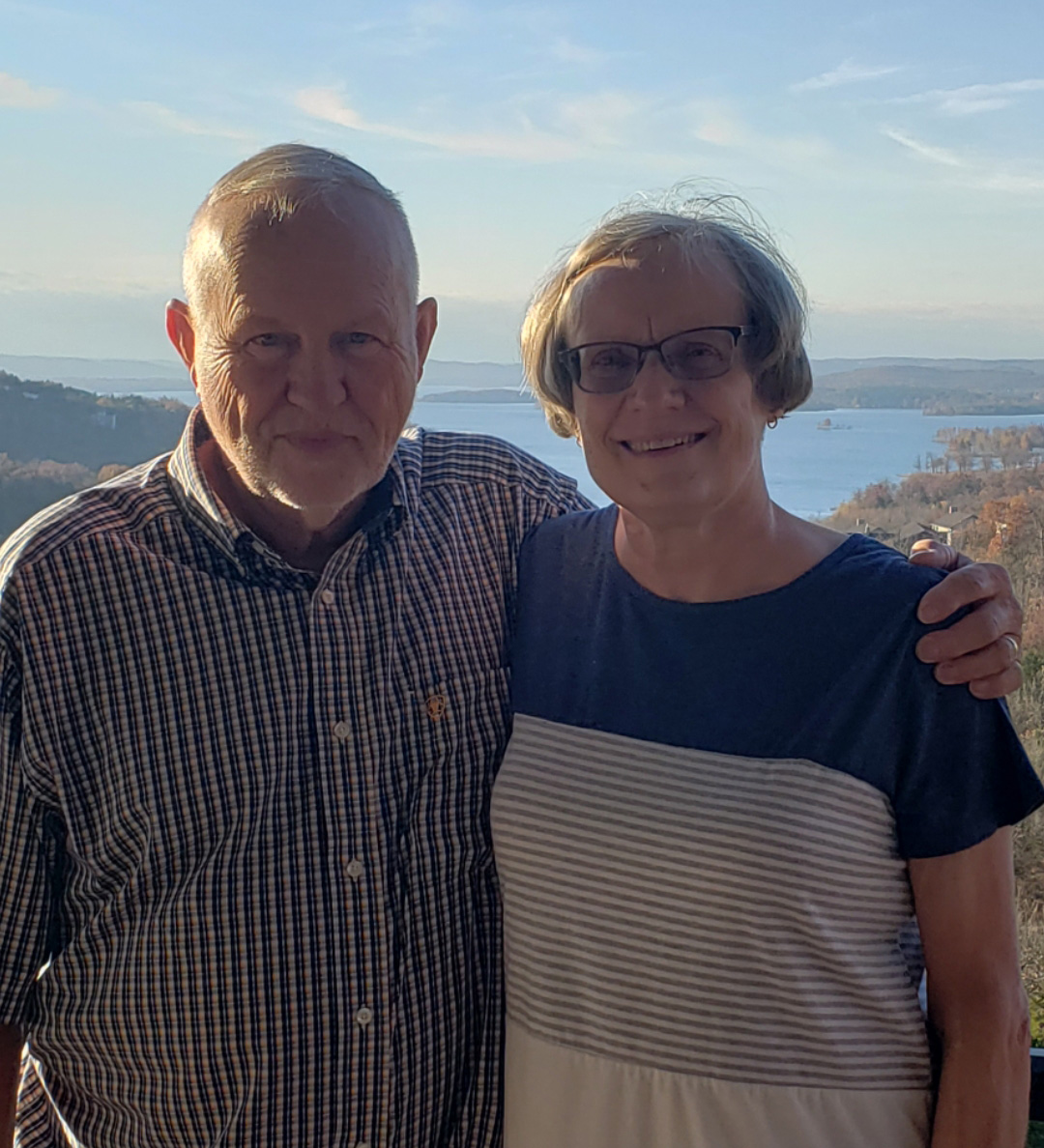
“I know that people with cancer go all over the country for treatment, but I wasn’t going to do that when Iowa City was just down the road with one of the top cancer centers.”
Immunotherapy, or using the immune system to kill cancer cells, is an area that is quickly gaining traction in the field of cancer medicine. Early results are encouraging, Milhem says, but every discovery creates additional questions worth exploring.
“Since I started practicing at Iowa in 2007, we’ve gone from a five-year melanoma survival rate of less than 5% to a five-year survival rate of about 50%,” Milhem says. “To watch melanoma evolve from an untreatable disease to a treatable disease is like a miracle. It’s a tremendous jump in understanding. But I want every patient to have that magical response, and the only way to help more patients is to continue doing basic research in the laboratory and using that knowledge to design trials.”
More than 170 investigators at Holden are trying to improve treatments, mitigate side effects, and find new therapies. To do this, they often follow up lab work with clinical trials, which can yield invaluable data—whether the tested therapy works or not.
The best ideas, says Holden director George Weiner, MD, won’t do any good if they can’t be tested.
“We are involved in cooperative group studies conducted collaboratively around the country through the National Cancer Institute. And if a biotechnology or pharmaceutical company has an exciting new cancer medicine, we can contribute to developing it by making it available to our patients,” says Weiner, a hematologist and oncologist. “But the trials we’re most proud of are those that come out of our own research. The treatment involving CMP-001, for example, was based on research done in my laboratory and those of my Iowa colleagues over many years.”
Iowa’s role in advancing cancer medicine
Cancer is among the leading causes of death worldwide, and it is predicted that two in five Iowans will be diagnosed with the disease in their lifetime, according to the 2021 Cancer in Iowa report. Experts at the University of Iowa Holden Comprehensive Cancer Center are dedicated to fighting cancer and improving therapies.
With its “comprehensive cancer center” designation from the National Cancer Institute, Holden is one of 51 institutions across 36 states—and the only one in Iowa—recognized for its leadership, resources, and research in cancer medicine.
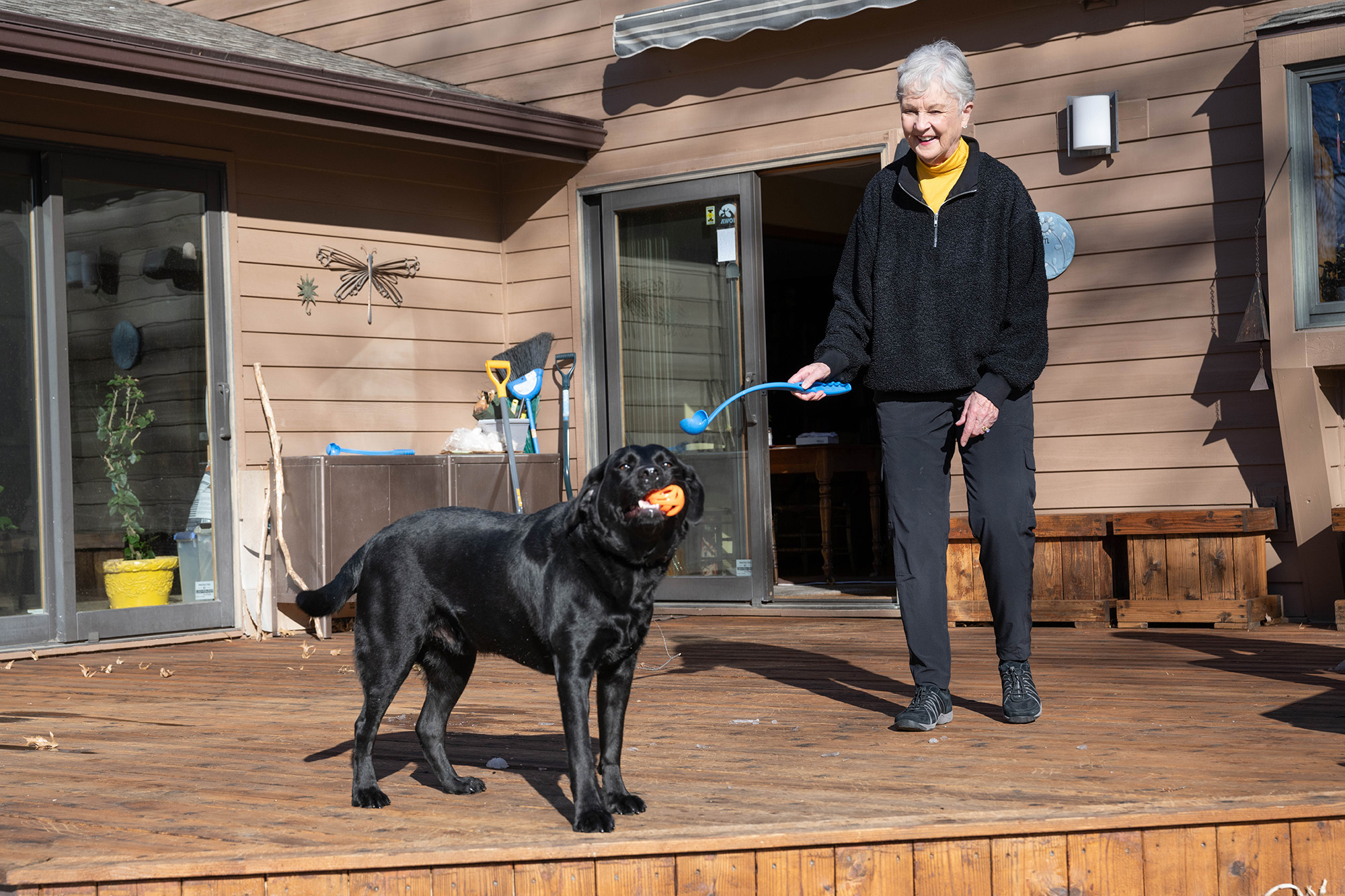
Camille Calhoun of West Des Moines was diagnosed with a brain tumor in 2019. After undergoing surgery, chemotherapy, and radiation, she participated in a vitamin C trial at the University of Iowa. She says every day she gets to spend with her family and her dog, Bodi, is a blessing.
Harnessing the power of vitamin C
Another area of study that has evolved at Iowa is the use of high-dose intravenous vitamin C to enhance cancer treatment. Based on earlier lab research by his peers that showed ascorbic acid to be toxic to cancer cells and not to normal cells, UI radiation oncologist Bryan Allen, MD, decided to test its effectiveness in treating a deadly brain cancer called glioblastoma. He knew that vitamin C crossed the blood-brain barrier and suspected it would give the immune system a boost. Preliminary results indicate that progression-free survival improves when vitamin C therapy is used with chemotherapy and radiation.
Camille Calhoun of West Des Moines participated in the vitamin C trial and received the equivalent of 87,700 oranges intravenously over the course of eight months after she was diagnosed with brain cancer in 2019. That summer, she had been playing in the yard with her black lab puppy, Bodi, when suddenly she couldn’t see him.
“I figured he’d run off, but he was right there by my side,” says Calhoun, now 81. “That’s when I realized I was not having any vision on the left side.”
Calhoun assumed the vision loss had to do with the glaucoma she had been treated for previously at University of Iowa Health Care Medical Center. When she called the glaucoma clinic, she was referred to a triage team, which immediately summoned her to Iowa City for testing. It turned out to be a brain tumor.
Two days later, UI neurosurgeon Matthew Howard, MD, was able to remove about 95% of the tumor. Although the surgery was considered a success, Calhoun learned the average life expectancy was 18 months. That’s when her oncologist, Varun Monga, MBBS, referred her to the vitamin C study.
“I knew right away I wanted to participate,” says Calhoun, a retired elementary school teacher who graduated from Iowa in 1962. “I was going to go on living for as long as I had left. That’s just the way I operate. I wasn’t going to dwell on the prognosis.”
A month after surgery, Calhoun started a six-week regimen of chemotherapy and radiation followed by the vitamin C treatment, which she completed in March 2020. She says every day she gets to spend with her family is a blessing.
“Right now I feel wonderful, and I’m having good return visits with the oncology team. The tumor has not reappeared on an MRI,” says Calhoun, who takes the opportunity to visit two grandsons enrolled at Iowa when she is in Iowa City. “I’m assuming it will come back at some point, but I’m not going to worry about it until it does.”
Calhoun says she encourages friends and family members not only to seek medical care at the University of Iowa, but also to participate in clinical trials.
“You have to research new ideas to find answers, and I think being an academic medical center enhances everything — from the research opportunities available to the quality of the care,” she says. “The care I’ve received at Iowa has been wonderful and very personal. You might not expect that from a large university hospital, but it has been very much that. I am so grateful for the doctors and nurses who have supported me throughout this journey. They are expert medical professionals, but they also are friends.”
Allen, whose cancer research also involves improving metabolism to decrease sensitivity to chemotherapy and radiation and minimizing age-associated toxicities to cancer therapy, says his Holden colleagues are studying the effectiveness of adding vitamin C therapy to standard treatments to other cancer sites, including pancreatic cancer, sarcoma, and non-small cell lung cancer.
“This is how we improve cancer therapy,” says Allen, who watched his grandmother and mother struggle through cancer treatments and was motivated to make improvements. “We might have lab data that suggests something may work in humans, but until we do the trial we don’t know for sure. Patients who participate in these trials are paying it forward to the next round of cancer patients.”
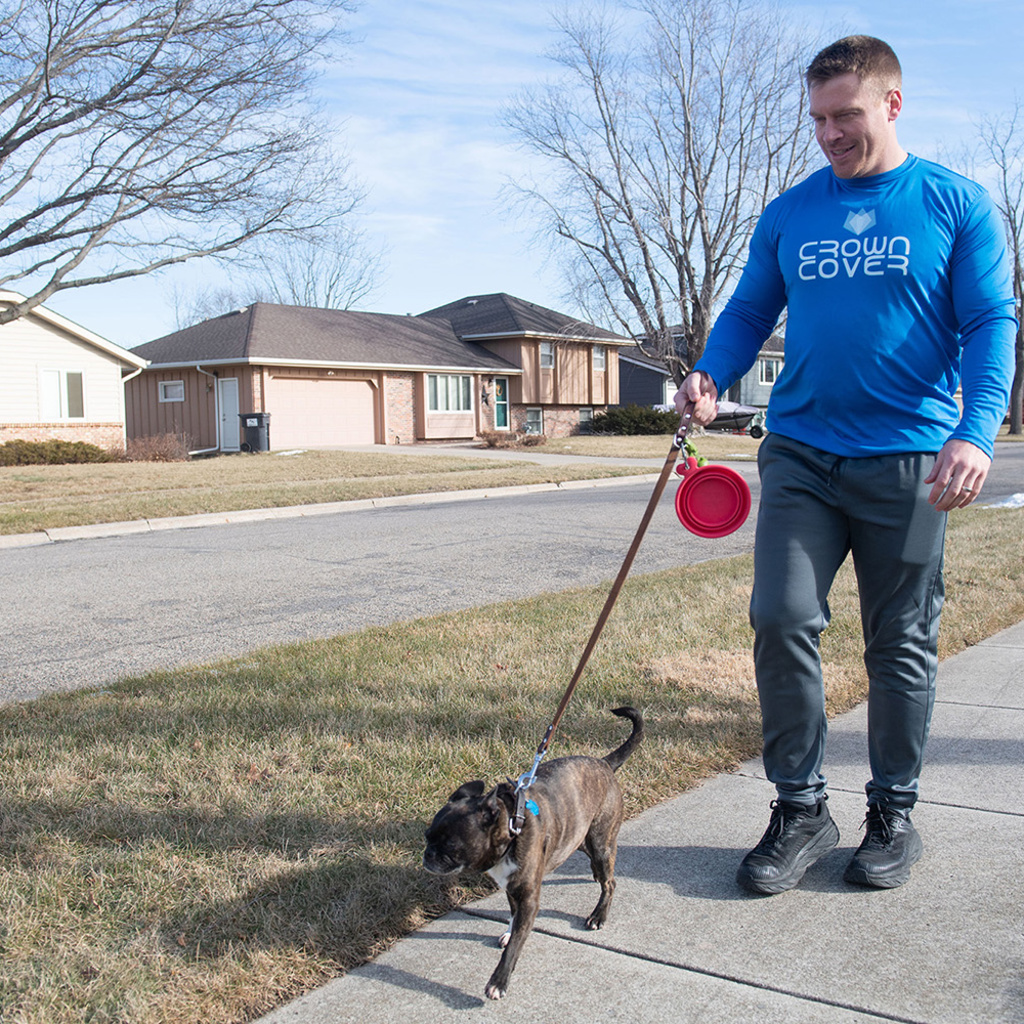
Raising awareness ... and needed funding
Jordan Hauck of Huxley, Iowa, sees great potential for advances to occur at the University of Iowa—and he is putting money behind it.
The survivor of stage 4 melanoma, who participated in clinical trials at Iowa and has had no recurrence since his treatments ended in 2014, created a line of clothing offering sun protection. Founded in 2019, Crown Cover sells shirts, hats, and arm sleeves for children and adults, and a portion of the proceeds go to the Holden Comprehensive Cancer Center.
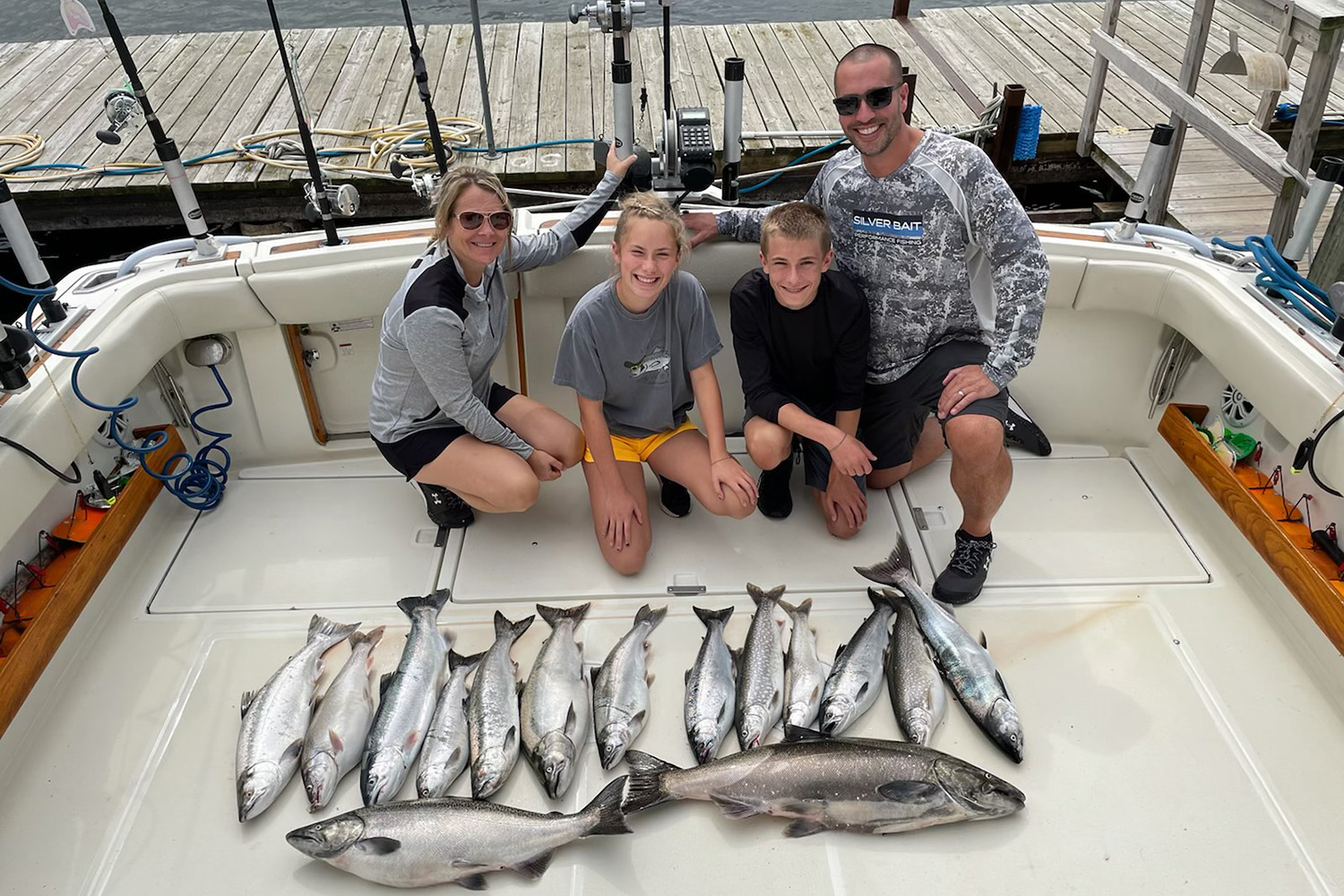
Jordan VanZandt and her family, who live in Tipton, Michigan, go on a charter boat excursion every year to fish for salmon.
Offering ‘an arsenal of options’ for rare cancers
It’s a seven-hour drive from Tipton, Michigan, to Iowa City, but it’s a trip Jordan VanZandt says she would make every month if her doctors at Holden requested it. It’s worth it, she says, to receive treatment from providers who have deep expertise in neuroendocrine tumors (NETs), a rare cancer that develops in hormone-producing cells, most often in the thyroid, breast, ovaries, and prostate. For now, she visits Iowa every six months.
The 40-year-old mother of two had surgery at a Michigan hospital in 2020 to remove a portion of a grapefruit-sized tumor from her kidney, but a follow-up scan six months later revealed that the cancer had spread. Her providers were unfamiliar with NETs originating in the kidney, so her husband, Michael, began exploring other health care options.
“Distance wasn’t really an obstacle in his mind,” says VanZandt, a manager at the staffing firm Manpower. “He was going to take me wherever I would go. We looked at various places across the country, but a lot of arrows pointed to the University of Iowa. No one else seemed to have the arsenal of options that Iowa had.”
Michael emailed UI endocrinologist Joseph Dillon, MD, with details about his wife’s diagnosis and received a response within a day. A few weeks later, the couple traveled to Iowa City to meet with Dillon and Chandrikha Chandrasekharan, MBBS, a UI oncologist. VanZandt says she was immediately encouraged by their teamwork — including with her doctor in Michigan.
“We looked at various places across the country but a lot of arrows pointed to the University of Iowa. No one else seemed to have the arsenal of options that Iowa had.”
In fact, Holden convenes weekly multidisciplinary oncology groups known as MOGs. For each type of cancer, there is a team of UI specialists — oncologists, surgeons, pathologists, imaging specialists, research scientists, geneticists, and therapists — that meets to discuss and determine the best treatments for each patient. The NET team is one of two research groups at Holden that has been recognized by the National Cancer Institute as specialized programs of research, or SPOREs (the other being lymphoma).
VanZandt’s treatment includes daily chemotherapy pills, monthly injections of lanreotide to help control the tumor’s hormones, and infusions every three months to strengthen her bones. She says she is in good hands at Iowa.
“I’ve only been to Holden twice, but I feel like they know who I am and that they really care about what’s going on with me and what I’m going through,” VanZandt says. “Even though the cancer is not curable at this time, I feel the prognosis is good. The options they have given us — what they call ‘the toolbox’ — feels a lot fuller in Iowa than it felt here [in Michigan].”
Not only is NET a relatively rare cancer — Dillon says about seven people in 100,000 in the U.S. will be diagnosed each year with NET — the tumors are slow-going and can be difficult to detect. Many providers at smaller hospitals have little to no experience in NET and are unable to provide a full range of treatment options. In contrast, Iowa has been operating a multidisciplinary NET clinic since 1999 and is recognized as a world leader in NET care. Patients come to Holden from around the globe, and in 2019 it became the first U.S. cancer center to be designated a Neuroendocrine Tumor Center of Excellence by the European Neuroendocrine Tumor Society.
“At Iowa, we see more than 800 patients each year with neuroendocrine tumors. That kind of expertise is critical in setting up a treatment plan,” says Dillon. “Over many decades, the University of Iowa has been at the forefront of developing therapies for NET as well as early detection tools like nuclear radioactive imaging. I am very enthusiastic that we will continue to make great progress — and have a huge impact on patients with NET.”
Converting white blood cells into cancer killers
As a comprehensive cancer center, Holden is at the forefront of discoveries in cancer medicine and able to offer cutting-edge therapy to its patients. It was among the first cancer centers in the nation to offer a novel therapy to patients with relapsed lymphoma, a cancer of the lymphatic system.
Arlene Barclay of Davenport, Iowa, was one of those patients. After she was diagnosed at age 49 in 2017 with diffuse large B-cell lymphoma, a fast-growing type of non-Hodgkin lymphoma, she endured chemotherapy and radiation with no luck, and her health deteriorated.
The failed treatments qualified her for CAR T-cell therapy, a form of immunotherapy that had been studied and tested at Iowa before its approval in 2017 by the Food and Drug Administration.
The therapy involves white blood cells called T lymphocytes, which are collected from the patient and then genetically modified in a lab to grow chimeric antigen receptors (CAR) on their surfaces. This process turns them into cells that hunt down and kill cancer cells, explains Umar Farooq, MD, UI clinical associate professor of hematology, oncology, and blood and marrow transplantation and head of Holden’s CAR T-cell program.
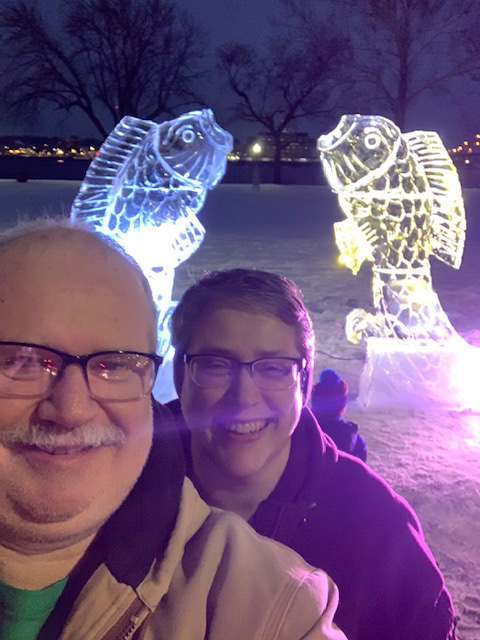
As home to a comprehensive cancer center, the University of Iowa is at the forefront of discoveries in cancer medicine. In 2019, Arlene Barclay of Davenport, Iowa, came to campus to receive CAR T-cell therapy, a novel treatment for an aggressive type of non-Hodgkin lymphoma. Now, she says she is enjoying bonus time with her husband, Brian, and their adult daughters.
“I feel like I have a second chance at life.”
“We admit the patient for low-dose chemotherapy to suppress their own immunity so they don’t reject the CAR T-cells. Then we infuse the engineered cells,” Farooq says. “The results are pretty amazing. Most patients in our trial were not going to make it beyond six months, but we are able to get 80% of patients in remission, including 50% in complete remission. My clinic today is made up of patients who wouldn’t be alive when I started here in 2014. It’s a very specialized treatment. We were one of the few centers that studied it in trials, and we are the only place that can offer it in Iowa.”
Within a week of the 2019 procedure, Barclay started noticing a difference in her health. Though she still manages fatigue and neuropathy, she is thrilled to have more time with her husband and their adult daughters. She also likes to sew, and has donated more than 100 handmade masks to Holden staff.
“I feel like I have a second chance at life. My husband and I go fishing as often as we can,” says Barclay. “The longer this treatment is available and the more trials they do, the more likely they will be able to expand it to other types of cancer and maybe even autoimmune diseases. It’s exciting, and I am extremely confident that significant strides in treatment will continue to be made at Iowa.”
“At Holden, we have members from across multiple disciplines, including medicine, nursing, dentistry, pharmacy, public health, engineering, and liberal arts, working together. We have different areas of expertise but the same motives, and that takes our work to another level. We’re all on the same team. Cancer is the adversary.”
Fighting cancer with collaboration
More than $70 million from the National Cancer Institute over the past five years has helped Holden investigators conduct a variety of cutting-edge research projects. One group, for example, is focusing on free radicals — unstable atoms that can damage cells — and their role in cancer development and treatment, while a team of population scientists is scrutinizing data to better understand which cancers are occurring in various Iowa regions and why. Still another is developing imaging techniques to better detect cancer.
But what sets Holden apart, Weiner says, is how well experts from across disciplines work together. That teamwork positions the University of Iowa to be a leader in cancer medicine.
“I would say our primary strength — our secret sauce, if you will — is the cultural sense of collaboration on campus. It’s something we do extraordinarily well, and it impacts not only our research but also the patient care and medical training we provide,” says Weiner, past president of the Association of American Cancer Centers and current advisory board chair at five NCI-designated cancer centers.
“At Holden, we have members from across multiple disciplines, including medicine, nursing, dentistry, pharmacy, public health, engineering, and liberal arts, working together,” he says. “We have different areas of expertise but the same motives, and that takes our work to another level. We’re all on the same team. Cancer is the adversary.”
Beth Frohwein, who lives close to her three children and nine grandchildren, says she wouldn’t hesitate to participate in further clinical research at Holden.
“I’ve gotten a lot of years I didn’t think I’d have because of the trial. The doctors in Iowa City are amazing. They care about you. You’re not just a number,” she says. “And if I can do something that will help someone else, maybe one of my own family members down the road, I will.”
Getting closer to a cure
Clinical trials at the University of Iowa and other cancer centers are key to making advances in cancer medicine.

